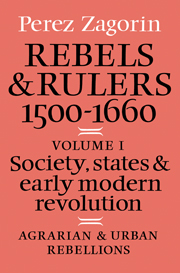6 - Religion, the Reformation, millenarianism
Published online by Cambridge University Press: 12 January 2010
Summary
Orléans, December 1560: the meeting (the first in seventy-five years) of the Estates General of France, summoned by the young king, Francis II, to advise a way to allay the strife between Catholic and Protestant that threatened his kingdom with civil war. The chancellor of France, Michel de L'Hôpital, addressed the assembly's opening:
The division of language is not what makes for the separation of realms. Rather it is the difference of religion … that divides one realm into two. Hence the old proverb, one faith, one law, one king, and it is difficult that men of … diverse and contrary opinions should refrain from resorting to arms.
There was more love, he lamented, between an Englishman and Frenchman of the same faith than between two Frenchmen of different faiths. In vain L'Hôpital pleaded for moderation, for France was shortly to be plunged into a destructive revolutionary conflict.
Eighty years later, in 1641, the English philosopher, Thomas Hobbes, saw his own country engulfed in similar troubles. The dispute over religion and between the spiritual and civil power, he then wrote, “has of late, more than any other thing in the world, been the cause of civil wars in all parts of Christendome.”
Later still, another British philosopher, David Hume, safe in the haven of the eighteenth century from the unimagined upheaval of the French revolution yet to come, looked back in his History of England upon the revolution that Hobbes had witnessed. He reflected on the explosive effects when the religious spirit mingles with faction.
- Type
- Chapter
- Information
- Rebels and Rulers, 1500–1600Society, States, and Early Modern Revolution, pp. 140 - 172Publisher: Cambridge University PressPrint publication year: 1982



